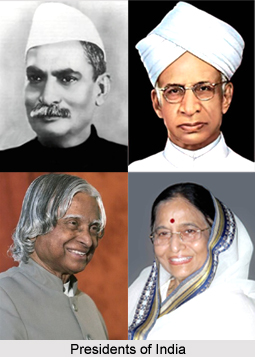 Article 52 of the Constitution penned that there shall be a President of India. Article 53(1) further says that the executive power of the Union shall be vested in the President and shall be exercised by him either directly or through officers` sub-ordinate to him in accordance with this constitution. But the constitution Forty-second Amendment Act, 1976 clearly and unequivocally lays down by modifying the provisions of Article 74(1) of the original constitution that there shall be a Council of Ministers with the Prime Minister at the head to aid and advise the President who shall, in the exercise of his functions, act in accordance with such advice.
Article 52 of the Constitution penned that there shall be a President of India. Article 53(1) further says that the executive power of the Union shall be vested in the President and shall be exercised by him either directly or through officers` sub-ordinate to him in accordance with this constitution. But the constitution Forty-second Amendment Act, 1976 clearly and unequivocally lays down by modifying the provisions of Article 74(1) of the original constitution that there shall be a Council of Ministers with the Prime Minister at the head to aid and advise the President who shall, in the exercise of his functions, act in accordance with such advice.
Qualification of Indian President
The Constitution of India prescribes the following qualifications for the office of the President.
It says that he must be a citizen of India and must be at least 35 years of age. Secondly, he must be qualified for election as a member to the House of the People; thirdly, he must not hold any office of profit under the Government of India or Government of any state or under any local or other authority subject to the control of any of the said Governments. The Vice-President, State Governors, Ministers and Legislators may seek election as President provided they have resigned from their former offices.
Election of Indian President
The Indian President is elected by an electoral college. The Electoral College consists of the elected members of the two Houses of Parliament and Legislative Assemblies of the States. The system of election that is followed in the election of Vice President is that of proportional representation through the means of a single transferable vote.
Tenure of Office of Indian President
The President is elected for a period of five years from the date on which he assumes office but he is eligible for re-election. The President`s office terminates on the completion of five years.
Powers and Duties of Indian President
According to the Constitution Forty-second Amendment Act, 1976 the President`s powers are to be exercised due to the ministerial advice. The Constitution Forty-fourth Amendment Act, 1979 provides that the President may send back a decision of the Council of Ministers for its reconsideration and after reconsideration by the Council of Ministers the President must act according, to the advice of the Ministry.
The powers of the President may be broadly classified under five heads, viz., (a) executive powers, (b) legislative powers, (c) financial powers, (d) judicial powers and (e) emergency powers.
Removal of Indian President
The President may resign in writing under his own hand addressed to the Vice-President. His office may also terminate by removal for violation of the constitution by the process of impeachment which requires that either House will prefer a charge of violation of the constitution before the other House. The latter then shall have to investigate the charge itself or cause the charge to be investigated. For preferring the charge, a resolution containing the proposal is to be moved after a 14 day`s notice in writing and signed by at least one-fourth of the number of members of that House. If the resolution is passed by not less than two-thirds majority of total membership of the House, the charge may then be preferred.
The President has a right to appear and be represented at such investigation. If after investigation a resolution is passed by at least a two-thirds majority of total membership of the investigating House declaring that the charge has been sustained, such resolution shall lead to the removal- of the President from the date of passing the resolution.
Since the 1950 when the post of Indian President was first introduced there are 14 presidents. They are Dr. Rajendra Prasad(1950), Sarvepalli Radhakrishnan(1962), Zakir Hussain(1967), Varahagiri Venkata Giri( 1969 ), Muhammad Hidayatullah(1969), Fakhruddin Ali Ahmed( 1974), Basappa Danappa Jatti (1977), Neelam Sanjiva Reddy(1977), Giani Zail Singh(1982), Ramaswamy Venkataraman(1987), Shankar Dayal Sharma(1992), Kocheril Raman Narayanan(2002), A. P. J. Abdul Kalam(2002), Pratibha Patil(2007).






